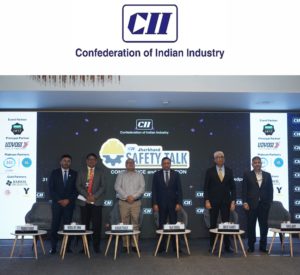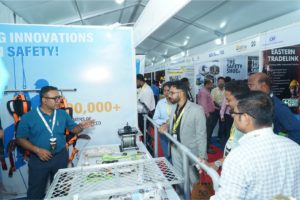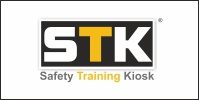
 Organized by the Confederation of Indian Industry (CII) Jharkhand, the 6th edition of the CII Safety Talk 2025, held on 31 October and 1 November 2025 in Jamshedpur, Jharkhand reinforced one resounding message: India’s journey toward industrial excellence must be powered by uncompromising safety, behavioral discipline, and responsible innovation. Over two intensive days, the conference and exhibition brought together over 300 delegates, more than 800 visitors, and 40 exhibitors, creating an ecosystem for cross-sector dialogue, cutting-edge solutions, and collaborative learning.
Organized by the Confederation of Indian Industry (CII) Jharkhand, the 6th edition of the CII Safety Talk 2025, held on 31 October and 1 November 2025 in Jamshedpur, Jharkhand reinforced one resounding message: India’s journey toward industrial excellence must be powered by uncompromising safety, behavioral discipline, and responsible innovation. Over two intensive days, the conference and exhibition brought together over 300 delegates, more than 800 visitors, and 40 exhibitors, creating an ecosystem for cross-sector dialogue, cutting-edge solutions, and collaborative learning.
The event focused on how human behavior, emotional well-being, and emerging technologies, including AI, analytics, wearables, and cyber safety are reshaping the safety landscape across sectors. Speakers from leading industries, government bodies, and global safety organizations emphasized that safety today is not merely a compliance requirement, but a strategic investment in industrial growth, workforce well-being, productivity, and societal progress.
 Setting the Tone: Safety as a Core Business Responsibility
Setting the Tone: Safety as a Core Business Responsibility
In his inaugural remarks, Mr Rajiv Mangal, Chairman, CII Eastern Region Safety Subcommittee & Vice President – Safety, Health & Sustainability, Tata Steel Ltd, highlighted that safety must now be seen as a core business responsibility, deeply integral to performance, reputation, and operational excellence. He emphasized that mature organizations increasingly rely on AI-driven prediction models, smart PPE, analytics, and remote operation centers to remove people from hazardous environments. Proactive utilization of plant-level data and CCTV footage, he said, must shift the focus from post-incident analysis to real-time risk detection.
Importantly, Mr Mangal underscored the rising significance of employee emotional well-being, noting that stress, burnout, and psychological fatigue have become major contributors to workplace mishaps. Safety, he emphasized, is a continuous journey of leadership, innovation, empathy, and discipline.
 Echoing this sentiment, Mr Abhijit A. Nanoti, Chairman, CII Jamshedpur Zonal Council & Managing Director, JCAPCPL, reminded participants that investing in safety is a moral obligation and a strategic investment that enhances trust, retention, productivity, and organizational sustainability.
Echoing this sentiment, Mr Abhijit A. Nanoti, Chairman, CII Jamshedpur Zonal Council & Managing Director, JCAPCPL, reminded participants that investing in safety is a moral obligation and a strategic investment that enhances trust, retention, productivity, and organizational sustainability.
From the Jharkhand government’s perspective, Mr Avinash Thakur, Labour Superintendent, Seraikela Kharsawan & Chaibasa, highlighted the urgent need for strict adherence to safety regulations, credible audits, and timely reporting. He stressed that proactive safety management, including medical examinations, exposure monitoring, and safe infrastructure forms the backbone of sustainable industrial growth.
CEO Leadership in Driving Safety Beyond the Workplace:
One of the marquee sessions placed a sharp spotlight on the indispensable role of leadership in shaping and sustaining a safety-first culture. Led by Mr Rajiv Mangal, the discussion underscored the importance of disciplined human behavior, consistent seatbelt use, and zero tolerance for drunk driving critical reminders in a country where nearly 20 road accidents occur every hour. Leaders emphasized that safety must be viewed as a shared responsibility rooted in visible leadership commitment, open communication without fear of retaliation, continuous learning, and the proactive “Find It, Fix It” (FIFI) approach to hazard identification. The session also drew from global best practices, highlighting Japanese methodologies such as the S-A-F-E-T-Y model and KYK (Kiken Yochi Katsudo) to strengthen hazard awareness and workforce engagement. Insights from industry leaders reinforced the need for cross-industry collaboration to elevate safety standards nationwide.
Session on “Safe Practices for Working at Heights”
Moderated by Mr Neeraj Sinha, Convenor, CII Jharkhand Safety Panel & Chief – Safety, Tata Steel Ltd, the session on “Safe Practices for Working at Heights,” highlighting its critical importance in preventing accidents and injuries. The session explored vital precautions, emphasizing the need for workers to be properly trained in using safety equipment and addressing potential hazards. A significant focus was placed on the correct use of appropriate personal protective equipment (PPE), such as harnesses, helmets, and fall arrest systems, all aimed at minimizing the risk of falls and ensuring a safer work environment.
MSME Leaders Roundtable: Strengthening the Backbone of Indian Industry
The important session focused on empowering Micro, Small, and Medium Enterprises (MSMEs) to build strong safety systems despite resource constraints. Key speakers, including Mr. Tapas Sahu, Mr. Biswajit Jena, Mr. Amarjeet Singh, and Mr. Rajjeev Shukla, highlighted practical strategies such as integrating safety into assembly layouts, performing regular audits, training employees for emergencies, and ensuring proper equipment maintenance. The overarching message was a call for MSMEs to embed safety as a fundamental operational philosophy rather than treating it as a mere formality.
Next Horizons: Safety Strategies for Large Enterprises
This session addressed the multifaceted challenges of managing safety within large, multi-layered organizations, where varied operations and diverse workforce groups create complex risk environments. Speakers emphasized that true safety excellence begins with leaders who genuinely “walk the talk,” consistently prioritizing safety over productivity pressures and setting the tone for organizational commitment. The discussion highlighted the need to build safety-aligned corporate strategies, adopt structured approaches for managing high-risk and heterogeneous workforces, and strengthen audit protocols to enable deeper learning from incidents. Emphasis was also placed on leveraging emerging technologies for predictive risk identification and prevention. The session, enriched by insights, underscored that large enterprises must combine leadership conviction, robust systems, and innovation to sustain a resilient safety culture.
Securing Industry: Countering Cyber Threats and Fraud
As industries continue their rapid shift toward digital platforms, the session underscored cyber safety as an essential and rapidly expanding dimension of modern workplace protection. Mr Mansoor Ahmad, Director–Outreach (East), Subharti Group of Universities, delivered a compelling address illustrating how cyber fraud has now surpassed traditional cybercrime in India, fueled by increasingly sophisticated online scams. He shed light on alarming trends such as fake internships, scholarship scams, fraudulent fee-collection schemes, and targeted social engineering attacks that compromise both individuals and industrial operations. Emphasizing that technological growth must be matched with informed vigilance, he highlighted the critical need for awareness, digital hygiene, and continuous cyber education. His insights reinforced that cybersecurity today is not just an IT issue but a foundational pillar of organizational safety and resilience.
Road Safety Awareness: Technology and Behavior
The road safety session brought critical attention to the fact that nearly 80% of road accidents arise from human error rather than infrastructural gaps, highlighting the urgent need for behavioral transformation on India’s roads. Speakers stressed that simple, consistent actions—such as wearing seatbelts, following traffic rules, and avoiding speeding or distracted driving—can significantly reduce fatalities. Alongside behavioral discipline, the session showcased emerging technologies like AI-enabled fatigue detection systems and mobile applications designed to alert drowsy drivers, reinforcing how innovation can complement human responsibility. With insights from Mr Neeraj Sinha, Mr Udit Verma, and Mr Jehaan A. Kotwal, the discussion underscored that meaningful, long-term road safety improvement must begin with early-age awareness and sustained public education.
Zero Incident Mindset: The Process Safety Way
In the concluding technical session, Mr Dave Bright, Coach & Advisor at DB Coaching Solutions, delivered a powerful message on adopting a proactive and prevention-driven approach to realize the goal of zero incidents, particularly within high-risk industrial sectors. He outlined a comprehensive framework that centers on building robust process safety systems, maintaining unwavering operational discipline, and sharpening hazard recognition across all levels of the workforce. Emphasizing the importance of eliminating risks at the source, he highlighted how well-designed engineering controls play a pivotal role in preventing catastrophic failures. Mr Bright reinforced that achieving zero incidents is not merely an ambitious slogan but a tangible and attainable standard—one that can be realized through consistent behaviors, disciplined practice, and resilient safety systems embedded deeply into organizational culture.
Industry Exhibition: Showcasing Innovation and Collaboration
The parallel industry exhibition served as a dynamic hub of innovation and collaboration, bringing together more than 40 exhibitors who showcased the latest advancements transforming the safety landscape. From state-of-the-art fall protection systems and smart PPE to AI-based monitoring tools, technical workwear, safety automation solutions, and powered access technologies, the exhibition offered delegates an immersive experience of real-world safety applications. Participants had the opportunity to engage directly with experts, explore hands-on demonstrations, and discover practical solutions tailored to diverse industrial environments. By fostering meaningful networking and enabling new partnerships, the exhibition played a pivotal role in strengthening the collective commitment toward safer, technologically advanced, and future-ready workplaces.
The event firmly established that safety is not just an industrial requirement, but a national responsibility—one that protects lives, builds trust, enables growth, and ensures that every individual returns home safely.
With Jharkhand emerging as a major industrial hub, platforms like CII Safety Talk serve as essential catalysts in shaping a future where innovation and safety progress hand in hand.
A Confluence of Knowledge, Leadership, and Responsibility
The two-day CII Jharkhand Safety Talk 2025 emerged as a powerful convergence of expertise, commitment, and forward-thinking strategies that collectively advanced the discourse on workplace safety. The event fostered a strong leadership-driven safety culture, emphasizing the need for consistent behavioral discipline supported by modern technology and AI-based safety tools. It successfully brought together MSMEs and large enterprises, strengthening their safety ecosystems through shared best practices, expert guidance, and collaborative discussions. With the growing relevance of digital transformation, the conference also spotlighted cyber safety as an essential new pillar of industrial protection. Road safety was reinforced as a national priority, underscoring behavioral change as the most critical driver of accident prevention. By promoting the zero-incident mindset and hosting a vibrant exhibition that showcased innovative safety solutions, the event enabled meaningful connections, knowledge exchange, and a collective commitment towards building safer, resilient, and future-ready workplaces across industries.























































